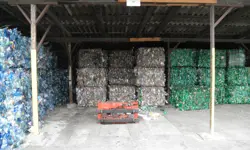
Preparing future engineers for the net zero challenge
Complex systems play an increasingly important part in people’s lives: supply chains providing fresh food from around the world to local supermarkets; power systems extracting energy from wind, sunshine, tides, biomass, and fossil fuels, and making it available 24/7 in sockets around our homes; international data networks connecting phones, computers, search engines, and media; the financial system allowing international credit card usage and providing finance for business and industry. The list of complex systems essential to our way of life is long and continually growing. But perhaps the most important are the interconnected systems of atmospheric dynamics, the carbon cycle, ocean salinity, and other parameters that control the earth’s climate, on which all others depend.
The planning and interconnectedness of complex systems
Some complex systems are engineered – that is to say there is a plan, the participants are known in advance, and there are protocols and regulations in place. A city metro system may be complex, but there is little ambiguity over its geographical extent, assets, operations, or responsibility for the safety of the network. Other complex systems can be ad hoc – there is no central authority, players join and leave at will, and regulation may be covered by multiple jurisdictions. The 2008 financial crash brought home the complexity, interdependence and riskiness of financial organisations.
From time to time, people find themselves in a complex system-of-systems that, until it failed, no one had thought of as connected. When, in 2015, Storm Desmond took out the electricity system in Lancaster, people were surprised how many other services – phones, health and social care, lifts and water supplies in tower blocks, cash machines, card payments, petrol stations, garage doors – were all affected, as detailed in the 2016 Royal Academy of Engineering report, Living without electricity.
Efficiency and Resilience
For half a century, the UK has been subjected to a mission, exercised with almost religious zealotry, to improve efficiency. Government appoints Efficiency Tsars; privatisation and contracting-out are justified by claimed efficiency benefits; shareholders demand greater efficiency to improve returns; efficient cars and heating systems produce less greenhouse gases; efficient farming produces more crops per hectare.
But efficient systems are often brittle and at the opposite end of a spectrum from resilient. An agricultural monoculture might be the most efficient way of producing food but, as was found in the 1840s Irish potato famine, can be a brittle solution, prone to fracture. Establishing a society that copes efficiently with the unpredictability of complex systems, achieves zero-carbon targets, and is resilient to natural and human-made disruption will not happen by chance. It will require careful analysis, different priorities, an engaged population, and, above all, a differently educated workforce.
Establishing a society that copes efficiently with the unpredictability of complex systems, achieves zero-carbon targets, and is resilient to natural and human-made disruption will not happen by chance
We need to be on the way to a zero-carbon society
Within 10 years, we need to be well on the way to a zero-carbon society. Mass production of internal combustion engines will be running down: novel transport systems, electric vehicles, cycling and walking will be the ‘new normal’. New homes will be built to Passivhausstandards (using little energy) and teams of technicians will be involved in converting existing houses from gas central heating to heat pumps, hydrogen or district heating. Research groups will be developing carbon capture and storage and renewable technologies. Energy storage will be high on the research agenda along with the design of networks of control systems to balance the demands of heat pumps, electric vehicle charging and smart appliances with whatever flow renewables are available. Control systems for ‘the smart grid’ will constitute a multi-faceted, heterogenous and hugely complicated network of complex systems, both above and below the meter.
To cope with this dramatic shift in technologies, we will need a dramatically different engineering workforce – different not only in technical skills but also in creativity, interdisciplinarity, flexibility, and motivation. Decarbonising a complex industrialised society is not something that can be planned meticulously in advance – it is easy to predict that life will be very different to today, but no one can predict how the challenges will evolve or how resilient solutions will be developed.
Equipping tomorrow's engineers with competences to tackle a global emergency
Over recent decades, engineering education has become conformist with narrowly defined learning outcomes and curricula, accredited standards and all their associated bureaucracy. The curriculum in some areas has been largely unchanged for decades, despite the rapid growth in analytical tools and changes in technology and the structure of careers. In the near future, the problems engineers will face in tackling the climate crisis and its impacts will be novel, unique, complex, and unbounded. Many will be in outwards-facing roles, working closely with sociologists, environmental scientists and politicians, requiring a very different set of competences and motivations. Understanding complexity and the balance between resilience and efficiency will be essential skills.
In the near future, the problems engineers will face in tackling the climate crisis and its impacts will be novel, unique, complex, and unbounded
The usual cycle for making changes to what engineers learn takes many years, from the painstaking negotiation of changes to UK-SPEC (the UK Standard for Professional Engineering Competence, which sets out the competence and commitment required for professional registration), through universities introducing changed curricula, to graduates emerging with new skills and becoming integrated into the workforce. This ponderous evolutionary cycle will not equip tomorrow’s engineers with the competences needed to tackle the global emergency in the timescale needed.
Three urgent actions are required:
1. The engineering profession, working with industry, needs to establish a realistic plan of how net zero will be achieved and to produce an estimate of the numbers of engineers and technicians who will be needed in different areas and the core skills they will need.
2. A team, mainly drawn from the professional engineering institutions and universities, needs to analyse the knowledge, expertise and skills decarbonisation will require and how engineering syllabi need to change to deliver these.
3. The Department for Education needs to work with industry and further education colleges to ensure there are suitable courses, apprenticeships and funding, both for young people joining the net zero workforce and for reskilling the many thousands of technicians and skilled workers in existing high-carbon industries.
To meet the challenge of net zero will require a revolution in engineering education – and that needs to start now.
***
Professor Kemp’s opinion was also published as a blogpost on the Royal Academy of Engineering’s website.
This article has been adapted from "Preparing future engineers for the net zero challenge", which originally appeared in the print edition of Ingenia 88 (September 2021).
Contributors

Professor Roger Kemp MBE FREng spent his early career in the rail industry, most recently as UK Technical and Safety Director of Alstom Transport. He joined Lancaster University in 2003, where he ran a master’s in safety engineering and researched decarbonisation of heating and transport. He is now an Emeritus Professor of Engineering and heavily involved in the Royal Academy of Engineering’s work on the safety of complex systems.
Keep up-to-date with Ingenia for free
SubscribeRelated content
Environment & sustainability

The extreme engineering behind life on an Antarctic station
Antarctica is one of the most challenging environments on the planet, but of enormous scientific importance to humanity. Technology and engineering is essential to enable the British Antarctic Survey's researchers to pursue their science effectively in this awe-inspiring landscape.

Recycling household waste
The percentage of waste recycled in the UK has risen rapidly over the past 20 years, thanks to breakthroughs in the way waste is processed. Find out about what happens to household waste and recent technological developments in the UK.

Upgrade existing buildings to reduce emissions
Much of the UK’s existing buildings predate modern energy standards. Patrick Bellew of Atelier Ten, a company that pioneered environmental innovations, suggests that a National Infrastructure Project is needed to tackle waste and inefficiency.

An appetite for oil
The Gobbler boat’s compact and lightweight dimensions coupled with complex oil-skimming technology provide a safer and more effective way of containing and cleaning up oil spills, both in harbour and at sea.
Other content from Ingenia
Quick read

- Environment & sustainability
- Opinion
A young engineer’s perspective on the good, the bad and the ugly of COP27

- Environment & sustainability
- Issue 95
How do we pay for net zero technologies?
Quick read

- Transport
- Mechanical
- How I got here
Electrifying trains and STEMAZING outreach

- Civil & structural
- Environment & sustainability
- Issue 95